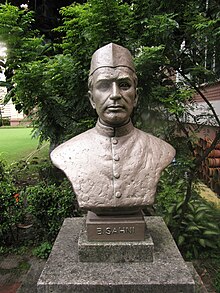Birbal Sahni
| Birbal Sahni | |
|---|---|

Bust of Birbal Sahni at Birla Industrial & Technological Museum
|
|
| Born | 1891 Behra, Saharanpur District, West Punjab |
| Died | 1949 Lucknow |
| Citizenship | India |
| Nationality | Indian |
| Fields | Paleobotany |
| Institutions | Lucknow |
| Alma mater |
Government College University, Lahore, Emmanuel College, Cambridge |
| Doctoral advisor | Professor Seward |
| Other academic advisors | Goebel |
| Known for | Bennettitalean plant, Homoxylon – a new type of petrified wood |
| Spouse | Savitri Suri |
Birbal Sahni FRS (14 November 1891 – 10 April 1949) was an Indian paleobotanist who studied the fossils of the Indian subcontinent. He also took an interest in geology and archaeology. He founded the Birbal Sahni Institute of Palaeobotany at Lucknow. His major contributions were in the study of the fossil plants of India and in plant evolution. He was also involved in the establishment of Indian science education and served as the President of the National Academy of Sciences, India and as an Honorary President of the International Botanical Congress, Stockholm. He died on 10 April 1949.
Birbal Sahni was born in Bhera, Shahpur District, West Punjab, on 14 November 1891. He was the third son of Ishwar Devi and Lala Ruchi Ram Sahni who lived in Lahore. The family came from Dera Ismail Khan and they frequently made visits to Bhera which was close to the Salt Range and Khewra's geology may have interested Birbal at a young age. Birbal was also influenced into science by his grandfather who owned a banking business at Dera Ismail Khan and conducted amateur research in chemistry. Ruchi Ram was a professor of chemistry at Lahore and was also a social activist with an interest in the emancipation of women. Ruchi Ram had studied at Manchester and worked with Ernest Rutherford and Niels Bohr. He sent all his five sons to study in England. Ruchi Ram was involved in the non-co-operation movement since the Jallianwala Bagh massacre as well as the Brahmo Samaj movement. The proximity of their house to Bradlaugh Hall made their home a centre of political activity and house guests included Motilal Nehru, Gopal Krishna Gokhale, Sarojini Naidu, and Madan Mohan Malaviya. Birbal Sahni received his early education in India at Government College University, Lahore (where his father worked) and Punjab University (1911). He learnt botany under Shiv Ram Kashyap (1882-1934), the "father of Indian bryology". He graduated from Emmanuel College, Cambridge in 1914. He later studied under Professor A. C. Seward, and was awarded the DSc degree of the University of London in 1919.
...
Wikipedia
